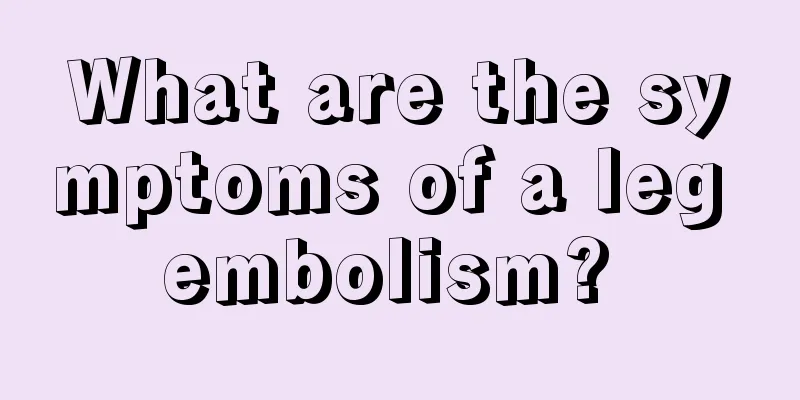What are the symptoms of a leg embolism?

|
Calf vein thrombosis is a very common peripheral vascular disease. If you unfortunately suffer from calf vein thrombosis, you will not only suffer psychologically but also be physically harmed. Generally, calf vein thrombosis will cause swelling of the patient's limbs, and then cause severe pain when the disease occurs, which will cause varicose veins. Some severe cases will also cause pulmonary embolism, which is life-threatening. The symptoms of calf vein thrombosis are mainly manifested in the following five points. 1. Swelling of the affected limb The affected limb has high tissue tension, reddish skin, higher skin temperature than the healthy side, and non-pitting edema. In severe cases, blisters may appear on the skin. There are also differences in the different swelling locations at the site of the blood clot. The swelling is usually most severe on the second or third day after the onset of the disease, and then gradually subsides. When it subsides, it first manifests as a decrease in tissue tension, and then a gradual reduction in the circumference of the affected limb, but it is difficult to return to its original state. 2. Pain and tenderness The blood clot causes an inflammatory reaction in the vein, causing persistent pain in the affected limb; the blood clot blocks the vein and obstructs venous return to the lower limb, causing swelling and pain in the affected limb, and the pain worsens when standing upright. Tenderness is mainly confined to the site of inflammatory response to venous thrombosis, such as the femoral vein or calf. Calf gastrocnemius tenderness is also called a positive Homans sign. 3. Superficial varicose veins Superficial varicose veins are a compensatory reaction and are generally not obvious in the acute phase, often manifesting as sequelae. When the main vein is blocked, the venous blood in the lower limbs returns through the superficial veins, causing the superficial veins to dilate compensatorily. 4. White swelling of thigh When acute deep vein thrombosis occurs in the lower extremities, the symptoms of leg thrombosis are swelling that is concave and high tension. The lower extremity edema reaches its highest level within a few hours, and the obstruction mainly occurs in the femoral venous system. When infection occurs, painful white swelling occurs, manifested as persistent spasm of the stimulated artery, with visible pale skin, swelling of the entire limbs, and dilation of the subcutaneous reticular venules. 5. Swelling of the thigh It causes spasm of the lower limb arteries, limb ischemia or even necrosis, shiny skin of the affected limb, accompanied by blisters or blood blisters, severe pain, and a bluish-purple skin color, which is called painful cerulea femoris. Symptoms of leg thrombosis are often accompanied by arterial spasm, decreased skin temperature, weakened or disappeared lower limb arterial pulsation, and then high-degree circulatory disorders. High fever, mental fatigue, prone to shock and wet gangrene of the lower limbs. |
<<: What are the side effects of interventional embolization surgery?
>>: How to deal with air embolism during infusion?
Recommend
The efficacy and function of gray moonstone
I believe that everyone does not know much about ...
What is the normal gallbladder wall thickness
The thickness of the gallbladder wall is closely ...
What is the standard height and weight for a 1 year and 6 month old baby?
In the process of raising their babies, parents p...
What is the reason for TG abnormality after hemisection of thyroid cancer
Thyroid cancer is a malignant tumor originating f...
How to remove lip pigmentation?
The human skin is full of pigment cells, and it i...
About the nursing measures for patients with lymphoma
For lymphoma patients, they not only need hospita...
What kind of wine can remove dampness
Drinking a moderate amount of alcohol can remove ...
What is the reason for sweating easily
Sweating is very common. When exercising, the hum...
How can facial depression be restored?
Today's aesthetic concept is that thinness is...
What to do if you have tinnitus after radiotherapy
Although radiotherapy can effectively reduce the ...
What are the symptoms of prostate cancer? 5 signs that indicate prostate cancer
Prostate cancer is a disease with an increasing i...
What are the benefits of drinking milk after taking a bath
Everyone knows that after taking a shower, a lot ...
How long does it take for human blood to circulate once?
Blood circulation is very important to the human ...
What's the matter with the two blue veins under the tongue?
The tongue is a relatively important organ in the...
What effects can calcification of the nuchal ligament bring?
Nuchal ligament calcification is a term that many...









